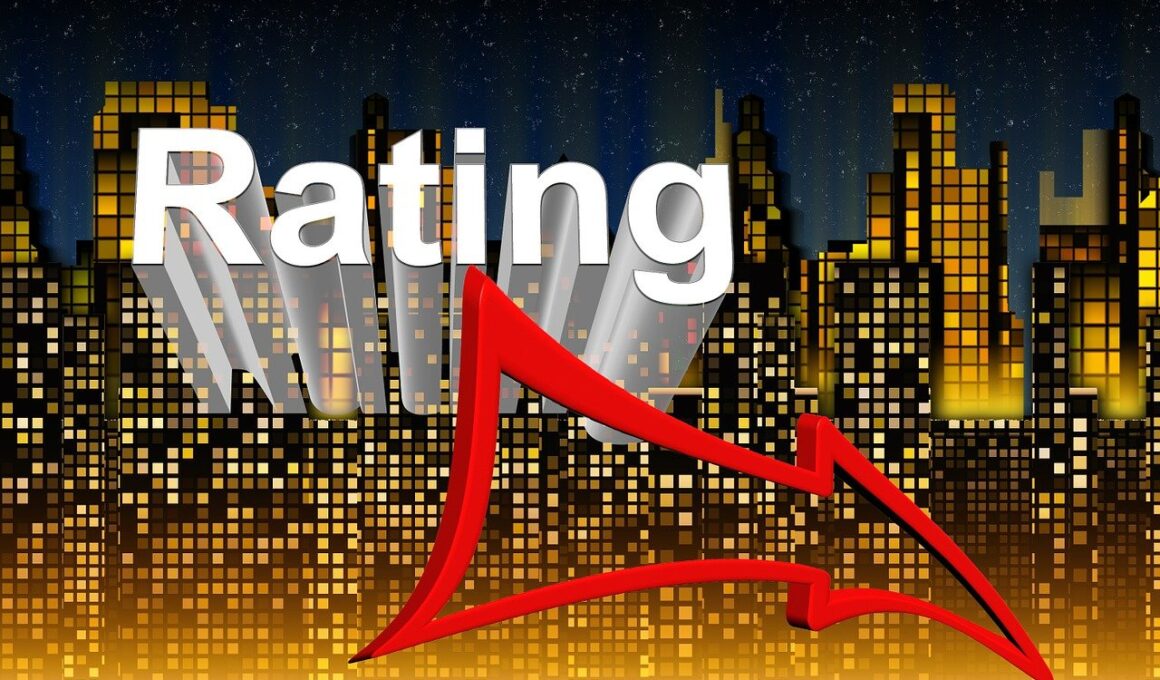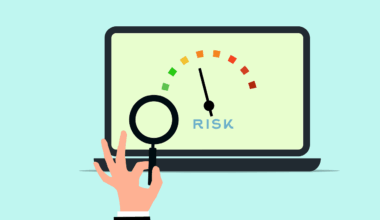Inflation’s Impact on Global Debt Markets and Credit Ratings
The recent surge in inflation rates globally has raised significant concerns regarding its impact on debt markets and credit ratings. Inflation directly affects monetary policy as central banks adjust interest rates to combat rising prices. This adjustment in interest rates influences borrowing costs and can lead to delayed investments across sectors. In particular, when inflation is high, governments may need to issue more debt to finance their deficit, which can subsequently raise credit ratings issues. Higher debt levels can deter potential investors who are uncertain of return on their investments, creating a ripple effect throughout various markets. On the other hand, companies with strong financial positions might benefit from inflation by increasing their pricing power, which can improve their cash flow. However, those with higher leverage face potential downgrades in their credit ratings as inflation exacerbates concerns tied to their ability to meet debt obligations. Additionally, a sustained inflation climate can lead to a devaluation of currency, further complicating debt repayments for international borrowers. Overall, understanding these dynamics is critical for investors and analysts in evaluating risk associated with debt instruments.
The relationship between inflation and interest rates is pivotal in determining the functionality of global debt markets. As inflation rises, central banks often increase interest rates to maintain economic stability. This makes borrowing more expensive for consumers and businesses, ultimately leading to reduced spending and investment. When companies and governments face higher interest rates, the cost of servicing debt increases, which may trigger a review of their credit ratings. Investors strategizing under such conditions must contemplate the implications of rising rates on their portfolios. It is crucial to assess how different sectors respond to inflation pressures, as some may experience growth while others may struggle with increased costs. The creditworthiness of various issuers becomes paramount, as those perceived to have weaker financials might face downgrades affecting their debt issuance capabilities. Additionally, nations with unstable economic conditions face acute scrutiny regarding their fiscal policies and ability to respond to inflationary pressures successfully. Therefore, maintaining a close watch on inflation trends enables market participants to navigate the complexities surrounding credit ratings and investment opportunities effectively.
Inflation’s Role in Shaping Economic Policies
Inflation influences not only individual markets but also overall economic policies and frameworks. Central banks worldwide utilize inflation indicators as critical metrics when considering monetary policy adjustments. A proactive approach might include tightening monetary supply to counteract soaring inflation, effectively controlling economic expansion. Policymakers must balance risks associated with inflation and the necessity for economic growth and employment opportunities. During periods of elevated inflation, some governments opt for austerity measures, which can constrict the economy further and potentially lead to recession. Conversely, others might increase public spending, which may provide a temporary buffer against inflation but could further inflate the debt burden. These decisions directly influence the yield curve and affect how investors perceive risk across various assets. Furthermore, financial markets reflect concerns over inflation through changes in bond pricing and yield movements. The performance of corporate bonds often indicates how market participants view potential inflation scenarios and their overall investment sentiment. As such, it is essential for investors to remain adept in recognizing the broader implications inflation has on economic policies and their subsequent effects on global markets.
Inflation’s impact on government bonds is particularly noteworthy, as higher rates may erode the value of existing debt securities. When inflation rises, the real yield on fixed-income investments declines, prompting investors to potentially favor equities or commodities that might provide better inflation protection. This shift in preference can lead to increased volatility in bond markets, resulting in widening yield spreads among various issuers. Governments issuing bonds in an inflationary environment could face rising borrowing costs, complicating fiscal policy strategies. Investors must navigate these conditions with caution as the implications for credit ratings are significant. As the cost of living rises and economic dynamics shift, bondholders may demand higher yields to compensate for the increase in inflation risk. Furthermore, maintaining healthy credit ratings is crucial for countries aiming to manage their debt levels effectively. With rising interest expenses, governments may find themselves at risk of downgrades, which can impact their ability to finance new initiatives. Continuous assessments of inflation’s trajectory become paramount for ensuring successful participation in debt markets amid changing economic climates.
The Influence on Corporate Credit Ratings
Corporate credit ratings are tightly linked to inflationary pressures, as increased costs of production hinder profitability and operational sustainability. Companies looking to maintain their competitive advantage must adapt to fluctuating price levels, which often involve strategic shifts in pricing models or operational efficiencies. Revenues may lag behind rising costs, leading to potential cash flow constraints that impact creditworthiness. Rating agencies scrutinize these dynamics rigorously, assessing how well a corporation can navigate inflation’s challenges. An inability to pass costs on to consumers can strain profit margins, impeding debt service capabilities. As a result, firms may find themselves in the crosshairs of credit rating adjustments. Investors must closely monitor how volatile inflation affects the entire sector, as those that lack pricing power are especially vulnerable to credit downgrades. Conversely, businesses with robust capital structures and operational flexibility are more likely to sustain and potentially improve their ratings amid persistent inflation. Ultimately, corporate leaders must align their strategic goals with economic realities to mitigate risks associated with inflation and the consequent credit ratings environment.
Rising inflation also poses challenges for institutional investors managing diversified portfolios amid changing debt landscapes. With a precarious balance between risk and return, institutional investors must pivot strategies to adapt to a potential shift in interest rates. Fixed-income securities, primarily government and corporate bonds, come under scrutiny as yield projections adjust with inflation forecasts. Diversification becomes increasingly vital, enabling investors to spread risk across asset classes that may respond favorably to inflation trends. Keeping a watchful eye on inflationary environments allows fund managers to align portfolios to capture returns while mitigating risks associated with credit downgrades. Equities, for instance, may thrive as companies raise prices and experience improved revenues, creating potential investment opportunities. Asset allocation strategies must incorporate anticipated shifts in inflation expectations, understanding that historical correlations may evolve with time. Additionally, real assets like real estate and precious metals may provide alternative means to guard against inflationary pressures. As inflation trends change, so too must the approach institutional investors take in managing risk and optimizing returns across their portfolios.
Future Prospects for Global Debt Markets
Forecasting the future of global debt markets amid inflation is a complex task, as multiple factors interplay to shape upcoming economic trajectories. As central banks navigate inflation control, decisions around interest rates will dictate market behavior and investor sentiment. The pace of recovery in the post-pandemic landscape will significantly impact inflation’s trajectory, impacting borrowing costs and credit ratings alike. Investors looking towards emerging markets must consider localized inflationary pressures, as these can vary significantly based on economic fundamentals, geopolitical dynamics, and regulatory environments. A closer examination of sovereign risks is warranted, as countries with volatile inflation histories often have unpredictable credit developments. Additionally, the transition towards sustainable and responsible investments may also alter the landscape, forcing investors to include ESG criteria when evaluating creditworthiness. As impacts of inflation evolve, adherence to sound fiscal management will form the foundation for maintaining investor confidence in global debt markets. Continuous assessment of inflationary trends will be essential for successfully navigating future developments, particularly within an interconnected, globalized financial system.
The evolving relationship between inflation and credit ratings will define the strategic considerations multinationals face in planning for sustainability and growth. Regulatory changes may prompt adjustments in how companies manage debt amid fluctuating inflation rates, shaping long-term credit profiles. Corporations aiming to adapt will need to harness digital innovations that streamline operational efficiencies, ensuring they remain competitive in price-sensitive environments. The investment community will likely remain vigilant on how organizations respond to inflationary trends, as proactive measures will likely enhance credit ratings stability. Discussions about inflation will extend beyond short-term pressures to encompass long-term implications for corporate governance and market positioning. Investors are expected to prioritize fundamentals that account for inflationary dynamics in assessing debt recovery prospects. Overall, sustained efforts to navigate inflation effectively will bolster corporate resilience, creating opportunities for strategic growth on the global stage. In conclusion, inflation’s role in shaping credit ratings reflects ongoing challenges facing various market participants. Those who align their strategies with evolving economic conditions will ultimately secure more favorable outcomes in an increasingly complex investment landscape.








